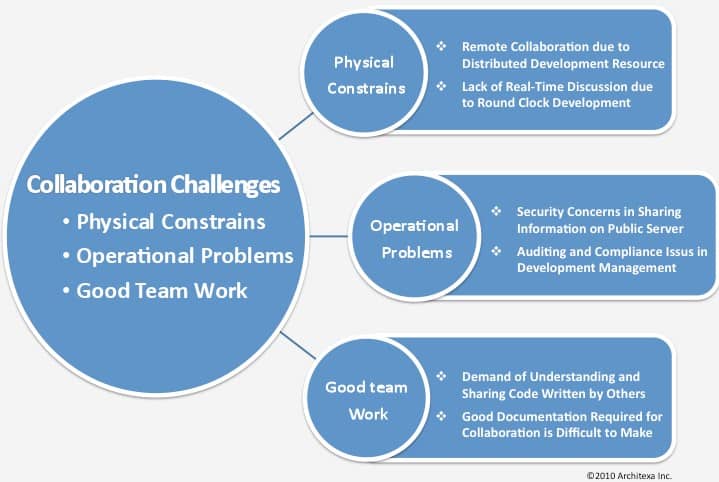MODIFIED ON: November 25, 2022 / ALIGNMINDS TECHNOLOGIES / 0 COMMENTS

Often in our work, we do not get managers, designers, developers, research experts etc. working in the same office premises. To get the right skills and experiences, we must expand our teams beyond within the same premises to locations in different cities, states of the same country and sometimes even to continents.
Managing spread apart teams is a very responsible task and even great managers struggle to establish successful collaboration among remote teams. To develop mutual understanding and trust among teams, to bring all team members to team’s objectives, to keep them stay on track, to give a fair deal to all teams irrespective of their locations etc. is a huge challenge that if not considered carefully can lead to disastrous results. There are some key criteria that need to be practised in order to have a successful set up for remote teams.

Courtesy – architexa.com
Collaborating with a remote team: The Dos
Define the team’s objective
All team members must unite on the team’s objective. Everyone must be clear on the common purpose and the team’s goals.
Team Charter is a great solution to this. Team Charters are documents that describe the team’s goals, resources, roles and responsibilities, deliverables, desired end results etc. Contents of Team Charter might vary from situation to situation, find out the right contents that will help you convey team objectives. This will help teams to stay focused on the right things and in the right direction. It also helps the team to get a big picture of their mission.
Use proper and consistent communication methods
Communication is a key factor in building up successful remote teams.
Make sure all your team members report their work status regularly, train other team members as needed, share knowledge, inform if they are stuck with their work so that proper guidance can be provided, and goals are met.
50 years back it was almost impossible to think of remote communication, but with all advanced technologies in the market today, remote communication and collaboration have become such an easy task.
There are so many free and paid online tools for chat, calls, video conferencing etc. that can be used efficiently to communicate requirements, discuss, share ideas and see results. Make sure all your teams use a common medium to chat, call, attend meetings etc. Skype, Instant Messenger, Google Hangouts etc. are some good tools to stay connected with the team through text, video and voice chat. Basecamp, Trello, BusyFlow, Asana are some of the good Project/Task Management tools. Dropbox, Google Docs, GlassCubes etc. can be used for File Management/Sharing with the team.
Arrange weekly status calls
Schedule team meetings and 1:1s on a regular basis. Schedule a time that works for everyone. Sometimes it might be difficult to find a common time among people working in different time zones and work schedule, talk to the team and make sure you come up with a time that suits all your team members and everyone attends the status call so that you can ensure tasks set for each milestone is successfully met.
Reward them
Be willing to reward your team for their good work! Before you decide on a perk, understand how your team want to be recognized. Learning how your team want to get recognized for an achievement will help you make sure your efforts to reward them is successful.
For example, married people might want a few days off so that they spend time with their families, tech addicts might be interested in gadgets. Some people might just want a sincere “thank you” note that gives them that feeling of recognition. Understand your team’s interests and reward appropriately. Don’t forget they are the ones who worked sincerely, taking all pressure, keeping aside their families and other priorities and bring your company the success and money you looked for.
Whatever way you do it will only help build up the team and people will remember for a long time thus, strengthening the bond of trust and loyalty.
In-person gatherings
Team retreats may not always be possible especially if the teams are in different cities or continents but if you can make it happen once a while, it will help people know each other, build connections and friendship that would, in turn, help build better and strong teams.
Collaborating with a remote team: Don’ts
Don’t be too bossy
Don’t put strict rules. Managers have to closely monitor work progress, but if you impose strict rules about working hours etc., people maybe not be able to bring desired results. This may demotivate them from their work bringing failure to your project plan.
Trust your team
Best and most productive teams are built from trust. Unified culture and solid trust build understanding among each other.
However, trust is a big problem in many parts of the world. Managers are not sure if they can rely on remote teams to produce results. There is a deep-rooted apprehension that absence in office (and working from home etc.) means neglecting work and becoming less productive.
Trust is a key factor to decide if you want remote teams or not.
Do not be unfair to teams
People get a feel of isolation or being left out or unrecognized if one team gets more appreciation/recognition than other teams. Recognize every team and every individual’s work however small it may be. Tomorrow that team/person may be the one contributing most to your company.
Conclusion
Remote Working – boon or bane is in our hands. Challenges are there for sure in remote working, but with little carefulness, commitment and planning, remote working can become a wonderful thing and I believe you can reap substantial benefits in the long run. Giving the flexibility to work at home or remotely greatly boosts employee morale, increases productivity and help staff retention. Making sure the right processes are in place and the right policies are applied, you can have successful communication and collaboration among remote teams.
Leave a reply
Your email address will not be published.
-
Recent Posts
- The Ultimate 4-Step Guide to Modernizing Your Applications
- The 12 Most Popular Computer Vision Tools in 2024
- How MLOps is Transforming Businesses in 2024
- The Ultimate Guide to Product Engineering Services for Businesses
- 5 Top Use Cases of Computer Vision in the Hospitality Industry
-
Categories
- MVP Development (5)
- AlignMinds (55)
- Operating Systems (1)
- Android POS (3)
- Application Hosting (1)
- Artificial Intelligence (23)
- Big Data (2)
- Blockchain (1)
- Cloud Application Development (7)
- Software Development (29)
- Software Testing (9)
- Strategy & User Experience Design (4)
- Web Application Development (23)
- Cyber Security (6)
- Outsourcing (7)
- Programming Languages (3)
- DevOps (5)
- Software Designing (6)
- How to Code (4)
- Internet of Things (1)
- Machine Learning (2)
- Mobile App Marketing (4)
- Mobile Application Development (18)
- Mobile Applications (5)







